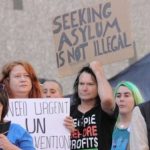Applying for Asylum: An Interview with Asylum Seekers Centre’s Steven Glass

At the end of May, Australian immigration minister Peter Dutton gave 7,500 asylum seekers until October 1 to lodge their applications for a visa, or face deportation.
Dutton went so far as to imply that some of these people – who made the dangerous journey to Australia by boat – were “fake refugees.” He declared the “game was up” for those who failed to lodge their applications on time.
But what the immigration minister conveniently neglected to mention was that many of these people weren’t allowed to apply for protection until last November. They’d been made to wait in limbo for years.
The legacy caseload
There are currently around 24,000 asylum seekers on the fast-track refugee assessment system in Australia. They arrived by boat between August 2012 and December 2013, and are part of what’s been referred to as the “legacy caseload.”
These people have been in the country for years, and yet their future remains uncertain.
The fast-track system was implemented by the Abbott government in December 2014, and in the minds of many it’s designed to set asylum seekers up to fail.
Sudden demands
In February this year, the Department of Immigration and Border Security sent letters to around 12,000 asylum seekers imposing unrealistic deadlines for the submission of their complex applications. It gave these people 60, 30, or sometimes as little as 14 days to get the materials in.
After years of being denied the ability to lodge applications, these people were suddenly asked to fill out the complicated document in English – not their first language – within a limited time frame.
And if their documents weren’t received within the stipulated time, these vulnerable people were then sent another letter from the department informing them that any hardship payments and support services they were receiving would be cut off.
Helping the vulnerable adjust
Despite what the government would like people to believe, it has been an extremely difficult time for these people –many of whom were fleeing persecution and war. Indeed, 70% of asylum seekers are ultimately assessed as refugees, passing the rigorous rules imposed by the government.
And while many awaiting their fate here in Australia are able to secure jobs and provide for themselves, there are some who are unable to find employment due to their lack of English, or because of the experiences they’ve suffered in the countries they fled from.
That’s where organisations like the Sydney’s Asylum Seekers Centre come in. Situated in Newtown, the centre has been providing services and support to asylum seekers since 1993.
It provides a range of services, including legal assistance and financial relief. For those who find themselves homeless, the centre can help them to find immediate short term accommodation, and assist in locating something more permanent.
The not-for-profit organisation helped over 1,655 people seeking asylum over 2015-16. It relies on grants and donations, as well as the vital work of volunteers.
For over 15 years, lawyer Steven Glass has been carrying out pro bono work for asylum seekers. Sydney Criminal Lawyers® spoke with Mr Glass, board member of the Asylum Seekers Centre, about the need for the legal community to help asylum seekers lodge their applications by the final deadline of October 1.
Firstly, Steven, what’s life like in Australia for people who are seeking asylum? How are they surviving in the community?
It varies a lot. And that’s why the Asylum Seekers Centre is there. It provides services for those people.
Most of them have work rights. One of the things that we do at the Asylum Seekers Centre is to help them get jobs. For the ones that are able to get jobs, it makes a dramatic difference to their lives because they’re able to be self-sufficient – live independently and with dignity.
They can send their kids to school, pay rent, get access to medical services and sometimes even send money home to their families.
For the ones that can’t get jobs, either because they’re suffering from post traumatic stress disorder, or some other condition, or because they’re English isn’t good enough, it’s very, very difficult. Some have to live off handouts, others have to get support from Church groups and other community groups.
There’s some recent policies changes that have helped a little. For example, they can now use public transport at concession rates. That sort of thing makes it a little bit easier.
There are a number of agencies. The Asylum Seekers Centre is one of them. And there are two or three others that provide assistance to those asylum seekers in the community that need it. Whether they need cash, or access to medical and psychiatric services, or accommodation and food.
There are agencies that provide for them. But for the ones that can’t get a job, life can be very, very difficult.
Apart from being traumatised in their own countries, most of them will have spent two, or even three years in detention centres in Australia. And that sounds like it’s not necessarily a terrible thing, but some of those detention centres are extremely basic.
Curtin Detention Centre is in the middle of the desert in the Kimberleys with nothing around it for miles and it’s stinking hot. There’s absolutely nothing for them to do all day. And they get very few visitors, because it’s in the middle of nowhere.
The fact that they’ve lived through three years of that adds to the trauma that they were already suffering. It makes it very difficult to adjust when they’re suddenly released into the community in Sydney or Melbourne or Adelaide.
In December 2014, the federal government placed these people seeking asylum onto what they call the fast-track system for refugee assessment.
What sort of changes did this system of assessment bring about?
It did a lot of things. So the pre-existing situation was that an officer from the Department of Immigration would interview the applicant and consider whether they had genuine refugee claims or not.
If that officer decided the claims weren’t genuine, you then had a right to appeal to the Refugee Review Tribunal.
The Refugee Review Tribunal would say, “I want to consider all your claims. Give me all your evidence, and we’ll start afresh. You’ve got rights.” If that was unsuccessful, you could then appeal to the Federal Court.
What the fast-track system did was it took away your appeal rights for the Refugee Review Tribunal. It also changed the rules and made it more difficult to prove that you were a refugee to start with.
For example, one of the rules is, if you don’t have a passport with you, the assumption is that you’re not a refugee, and you have to displace that assumption. That is a grossly unfair assumption. Most people who arrive by boat don’t have a passport, because the people smugglers confiscate them.
So all of a sudden, there’s an assumption that you have to lose your application, because the people smugglers took your passport away. That was never an assumption.
They changed the rules to make it harder to show you are a refugee. And then, if you failed, they took away your appeal right.
They’ve now got a fast-track appeal, but that appeal doesn’t give you any right to start afresh, and present your evidence afresh. All it does is look at the paperwork that was given to the officer below. There’s no right to an interview by the appeal body.
They just look at the paperwork and say, “Does it look like this officer got it right, or wrong?” without any ability to assess the applicant, because they don’t get to interview them.
So the appeal has been dramatically weakened. It’s virtually not an appeal at all. And the rules have been changed to create a huge disadvantage to applicants.
In February this year, the immigration department sent out letters to around 12,000 asylum seekers requiring them to fill out applications for visas in a very short time frame.
What sort of difficulties did this pose for these people?
The form is more than 60 pages long. It’s very complex. In fact, I sat with an asylum seeker just last week to do the form. It was already pre-filled in by a friend of hers. So I didn’t have to go through everything.
Even just going through the things that I thought needed a bit more detail – or needed to be corrected – it took me four hours. And I’m very experienced. I’ve been doing this for 15 years.
But this woman doesn’t speak English. She has to do it through an interpreter and the questions are extremely detailed.
That took four hours just to do the form, without the other stuff that has to be done, which is the supporting statement. I had to send her away, and have her come back another day to do that.
Probably, to get it done reasonably well, it takes six to eight hours. And in some case, where somebody has a particularly difficult refugee claim – you need evidence from other places – it can take days.
What happened was, in 2012 the Gillard government appointed an expert panel to come up with some ideas for how to deal with the refugee issue. They introduced the no-advantage test.
The way this test was implemented was that people were told they were going to have to wait before applying for their visa, just as if they were still in Indonesia waiting for a boat. And that was the way no-advantage was implemented, you wait in Australia, just as if you were waiting for a boat.
That’s why these people have been sitting around for three, four and five years in some cases, being told by the government that they’re not allowed to apply.
Then in February this year, they were told that “Now you have to apply and you only get a few months to do it. There’s this complex 60 page form that takes four to eight hours to fill in. And by the way, you won’t be given any legal assistance.”
What that means is that these people have, all of a sudden, got six or seven months to find a lawyer, find an interpreter, and find the time to do this very long form.
For the 12,000 that are left, it’s an extremely difficult thing to do – to find a lawyer and find the interpreter for assistance.
So this was back in February, what actually did happen to these people if they weren’t able to get their applications in on time?
We’re not over yet. They’ve been given until October. A lot of the refugee legal services, and other services have pulled together huge groups of volunteers to assist refugees in completing their forms.
So everybody is at least getting a form lodged. But the problem is because there’s not time, it’s not an application that puts your best foot forward and gives you an opportunity to provide the best description of what your refugee claims are.
Because of the help of the huge numbers of volunteer lawyers, most people are getting their claims in. There are some exceptions. People who don’t receive a letter, or people who receive a letter and don’t understand the significance.
But, by and large, the people who need to get the claims in, they’re getting them in. Although, they don’t have the time to do it properly.
So the Asylum Seekers Centre provides legal services?
The centre provides limited legal services. The main volunteer refugee legal service is called RACS: the Refugee Advice and Casework Service. They’ve got three or four or five rosters of lawyers. They’re churning through people as quickly as they possibly can.
The centre is also providing housing. What’s it like for people living on temporary visas, trying to find accommodation in Sydney?
The key to it – as I said earlier – is if they’ve got work rights that solves a lot of these problems. Then they can afford to pay rent.
But for the ones that haven’t got work rights, some of them get a very small allowance from the Red Cross. Some of them don’t and they need to rely on community service organisations like us, and others.
So there are some people out there that don’t get work rights?
It’s not that common. Most people do get work rights. But there’s no clear rules about who gets them and who doesn’t. Every now and again, there’s somebody who doesn’t.
But the other thing about it is it’s not only if you don’t get work rights. You might have work rights, but because you’re ill, or you’re traumatised, or you don’t speak English, you just can’t find work.
This woman that I saw the other day had lived her life as a peasant farmer in her home country. She can’t read or write her own language, and certainly, can’t speak, read or write English.
Basically, other than working in the fields in a peasant lifestyle in her own country, she’s got no skills and she’s got no English.
There’s just no way she can get a job.
And lastly, you’ve been working in this sector for 15 years now, what do you see happening with all these people having to get their cases processed in the coming months? What’s going to happen in October?
That will be interesting, because such an effort has been made with these huge rosters of volunteers set up, I think most will get their applications in.
So what I actually think is that the government isn’t resourced to deal with all these applications between now and October. I actually think these people are going to end up waiting for another couple of years.
This October deadline is 100 percent arbitrary. And it was set by government just to make life difficult for people and not because the government can actually deal with them by that time.
I think we’ll still be seeing the processing of these people all throughout next year, and maybe the year after.
Steven thanks very much for taking the time out to speak with us today.
That’s OK. No problems at all.
If you’d like to donate to the Asylum Seekers Centre, you can do so here.







